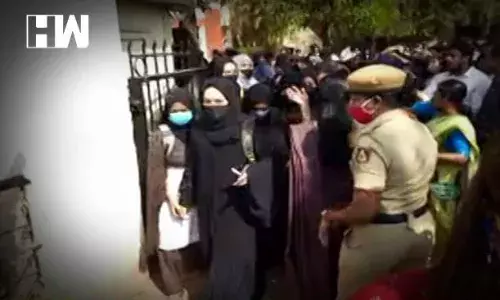Bangalore: On Thursday the Karnataka High Court restrained all the students from wearing any religious attire at the educational institutes till the matter is with court. The next hearing on this matter will take place on Monday.
After the matter was transferred to a larger bench on Wednesday, the full bench comprising Chief Justice Ritu Raj Awasthi, Justice Krishna S Dixit and Justice JM Khazi heard the matter.
During the hearing, advocate Sanjay Hegde, while appearing for the students said that discrimination is being faced by girls at classes, as they were made to stand out since December last year, Live Law reported.
The students lawyer argued that there was no provision for a school uniform, citing that as per the Karnataka Education Act, uniforms were school phenomenon, the website quoted Hegde.
The advocate general arguing for the Karnataka government said the regime wanted institutions, but schools and colleges can’t start with one set of students wearing headscarves and another set wearing saffron shawls.
On Wednesday, Justice Dixit while hearing a bunch of petitions filed by Muslim girls from Udupi had said that the issues had given rise to certain constitutional questions of seminal importance.
Earlier, the hijab row that has ignited protests in Karnataka colleges was raised before the Supreme Court today. As Congress leader Kapil Sibal, a senior lawyer, urged the court to take up an issue that he said is “spreading across the country”, Chief Justice of India NV Ramana said: “We will see.”
Sibal raised the petition filed in the Supreme Court by Fathima Bushra, a college student in Karnataka, who says her fundamental rights have been violated because of restrictions on the hijab.
In the past week, campuses in parts of Karnataka have seen tension and protests over restrictions on wearing the hijab in class. The standoff intensified with rival protests by saffron scarf-wearing students and clashes between groups of students that led to police action, including teargassing.
The Karnataka High Court, hearing a petition by five girls who were not allowed to attend classes wearing the hijab, yesterday referred the case to a larger bench citing the “enormity of questions” involved.
“This deals with what’s happening in Karnataka. It is spreading in the entire country,” Sibal told Chief Justice Ramana.
The Chief Justice said: “Let the High Court hear the matter. Today it is listed before the three-judge bench.”
But exams are two months away, Sibal pressed.
“We have filed a petition this morning. This matter has to go before nine judges,” he said.
“This is too early for us to take up at this stage. Let’s see some interim relief the High Court may give,” the Chief Justice replied.
“If we list the matter the High Court won’t hear the matter,” he added.
Sibal argued that it was urgent that the Supreme Court took it up. “Schools and colleges are closed. Girls are being stoned. This issue must be considered,” he said.
When Chief Justice Ramana repeated that the High Court should hear it first, Mr Sibal said: “I’m asking this court to list it. If the High Court doesn’t pass orders this court can transfer it to itself and hear it.”
The Chief Justice responded: “We will see.”
Fathima Bushra, the petitioner, is a student at the PU College, Kundapura in Karnataka’s Udupi, where the protests began after the authorities recently ordered students to remove their hijab in class. “It is imperative that Supreme Court take it upon itself to decide once and for all the extent of protection that a Muslim girl has under the Constitution of India,” says Fathima’s petition.
“The petitioner does not wear the hijab as a form of any political symbolism or to intimidate or heckle or belittle her fellow classmates or any other person. The state machinery has absolved itself of its obligation to ensure a conducive environment for petitioner and similarly situated girls to exercise their fundamental rights,” it says.
Fathima Bushra argues that “segregating Muslim girls and forcing them to sit in a room other than the regular classroom is an affront to the equal protection clause in Article 14”.
As an independent media platform, we do not take advertisements from governments and corporate houses. It is you, our readers, who have supported us on our journey to do honest and unbiased journalism. Please contribute, so that we can continue to do the same in future.

